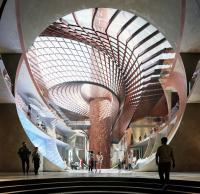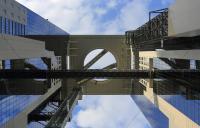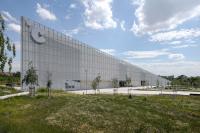Sun Tower
Yantai, China
Designed by OPEN Architecture, Sun Tower is an oceanfront public cultural facility in Yantai Yeda Development Zone, featuring outdoor theater, digital exhibition spaces, library, café and bar. Atop the summit is a unique semi-outdoor “Phenomena Space”.
Archeological discoveries revealed that Yantai was among the earliest places in China where ancient sun-worshiping culture emerged. OPEN designed the Sun Tower to capture and celebrate natural phenomena, re-establishing people’s connection with nature’s spiritual power while bringing much-needed cultural and communal facilities to the new urban district. The digital exhibition spaces and the library are intended to foster discussions on coastal community collaboration and raise environmental awareness.
The geometry of Sun Tower is sculpted by the movement of the sun observed from the vantage point of the site. The northern edge of the building’s outer shell is parallel to the noon sunlight on the equinoxes. The outdoor theater’s axis points towards sunrise over the legendary Zhifu Island on summer solstice, while the entrance tunnel aligns with sunset on the winter solstice. The roof’s circular outline lies on a plane perpendicular to midday sunlight on the summer solstice.
Most spaces in the building are not air-conditioned during summer. Instead, the design relies heavily on passive strategies to maintain interior comfort while significantly reducing energy consumption. These strategies include employing tunnel cooling for fresh air supply, using thermal mass to reduce indoor temperature fluctuation, inducing cross ventilation, and utilizing chimney effect to remove hot air, effectively expanding people’s comfort zone through enhanced indoor airflow.
The building features shell structure. Two layers of white concrete shells form the main body, connected and braced by slabs and ramps. Facing the ocean, the concave inner shell of the building acts as a sound collector, absorbing and amplifying sounds from the sea. At its base is a semi-outdoor theater which also serves as a place for relaxation and sea observation.
A smaller upside-down shell atop the inner shell houses the library and the Phenomena Space. The library offers both traditional and digital books. Reading under the sky and above the sea is a very unique experience. The phenomena space is a semi-outdoor void space left intentionally undefined. Its horizontal opening facing the ocean frames a spectacular view. The oculus opening at the center of the roof allows rainwater to enter and be captured by a small pool. The water in the pool swirls for 9 minutes every hour, from 5 am to 9 pm each day, working as a special time device.
In the middle of the building, between the inner and outer shells is the Digital Exhibition Space, which zigzags upwards along the ramps. New technologies enable the exhibition contents to be easily changed. A portion of the tie holes in the interior walls are carefully treated but unfilled in so that they can be used to hang objects. Additionally, there are also pairs of hanging points strategically embedded into the ceilings.
The building sits on a seashell-shaped plaza. The tower's footprint together with the stage of the outdoor theater completes a full circle. When not in use for performances, the stage becomes an area with mist and fountains. The plaza’s floor rises outwards from the stage towards the sea, forming a large outdoor amphitheater.
Radiating from the center of the plaza is a series of elliptical rings, resembling planetary orbits. A water channel, tangent to the tower and carved into the stone plaza, marks the passing of time on the equinoxes—the shadow of the tower’s northern edge moves exactly along the channel, intersecting each elliptical ring on the hour. Embedded in a segment of the outer ring are fountains celebrating the 24 Solar Terms of the traditional lunar calendar. On normal days, the fountains’ sprays synchronize with the sea’s high and low tides.
Overall, Sun Tower is special as a building typology, it is a cultural “lighthouse” where ancient wisdom in respecting nature is integrated with contemporary urban cultural life. The architecture frames and transforms invisible energies—air, light, sound, and natural phenomena—into tangible and visceral experiences, allowing people to establish moments of connection with the universe and otherwise endless cycles of nature.

















